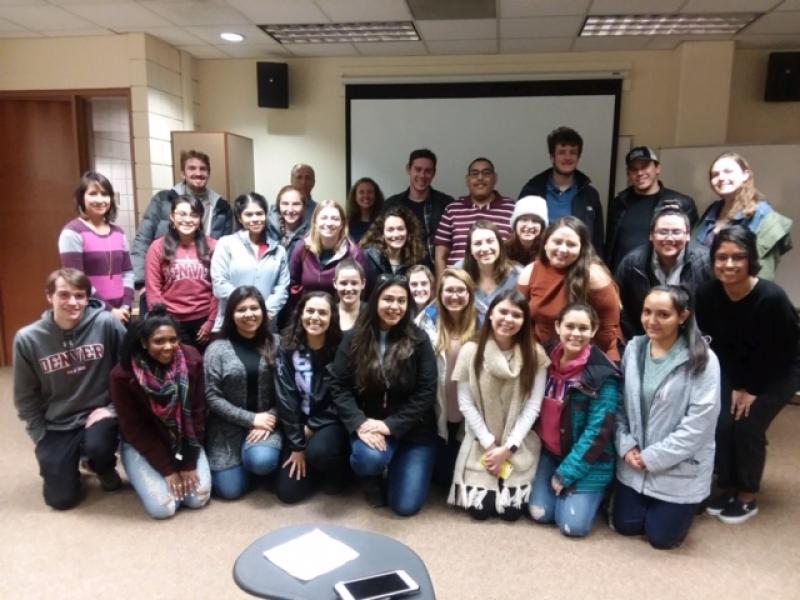CILCA Supports Casa de Paz Learning Community

Photo of students in the "Immigration in the 20th Century U.S." and "Deportation Nation" courses.
When Jimmy Hessler was 12 years old, he made a friend. A young boy from Mexico had just moved with his sister to Hessler's hometown of Jackson, Wyoming, where the siblings reunited with their mother. Hessler and the young boy started spending time more time together. Their friendship grew over the years, and they even started a soccer camp together to bridge cultural gaps and provide recreational and educational opportunities for kids in the Jackson area.
Suddenly, after two years of building the program together, Hessler's friend had to depart from Jackson when his Deferred Action for Childhood Arrivals (DACA) status was revoked. Hessler still remembers being devastated by the news as he watched his friend return alone to Mexico, a place he thought had left for good 12 years ago. His friend had to create a new home in Mexico on his own, Hessler says, and his family had to recreate their own home without him.
"My relationship with him, as well as with this youth community in Jackson, their parents, and the Mexican community there—they opened my eyes to what deportation is, and what the consequences of immigration policy are for individuals," Hessler said.
During his time as a University of Denver student, Hessler hasn't forgotten what he learned from his friend. Now, students like Hessler can follow their dreams to help detained immigrants get the help they need and reunite with their families, thanks in part to a generous grant from the Andrew W. Mellon Foundation that supports DU's Center for Innovation in the Liberal and Creative Arts (CILCA).
Along with other projects, the $250,000 Mellon Foundation grant supports DU's Casa de Paz Learning Community, spearheaded by Elizabeth Escobedo, an associate professor of history.
In 2017, Escobedo launched a service-learning class that partnered with Casa de Paz, an Aurora nonprofit that offers housing, meals, visits, and transportation to immigrants recently released from immigrant detention. This academic year, Casa de Paz has been a partner for four service-learning courses within CILCA.
Hessler and his fellow service-learning students in Escobedo's "Immigration in the 20th Century United States" course meet with adults who are detained at the immigrant detention facility in Aurora. They provide home-cooked meals to the men and women who are released, and help them arrange travel plans to reunite with their loved ones.
The service-learning format is so effective, Hessler says, because it allows students to learn about the history of immigration policies in the U.S. while interacting with people affected by those exact policies. Multiple students' service-learning work with Casa has inspired them to continue volunteering well beyond their required hours for class.
One of the many benefits of the Mellon Foundation's grant is that it will provide funds for Sarah Jackson, Casa de Paz founder and executive director, to expand her role in the partnership as an expert in residence at DU. Jackson has been an integral piece in her organization's partnership with the University.
The funding will also help students receive key assistance as they serve. For example, they can receive reimbursement for the costs of transportation to the detention center or the cost of groceries purchased to make meals for recently released immigrants.
"For students who maybe are strapped for resources, even just a tank of gas might make a difference as far as their participation," said associate professor Lisa Martinez, whose "Deportation Nation" sociology class also partners with Casa. "I think of those resources as really making a difference at all kinds of levels."
In just a few years since the partnership began, Escobedo has already seen positive results.
"Time and again, I have students note that they never would have learned what they learned in this course without the service-learning experience," Escobedo said. "There's only so much you can learn in a text. When you have a fellow human being talking with you about their experiences, and you see the emotions on their face and you understand their expressions, it's a whole different type of experience."
Martinez notes the importance of students doing immigration-related work in light of current political and social debate.
"Many feel that in recent years the level of vitriol and rhetoric [about immigration] has really been amped up," she said. "I think it's especially beneficial for students to have these experiential learning opportunities where they can really see for themselves in many ways."
Hessler, now a senior, has since reunited with the friend he once knew in Jackson. His experience in service-learning has inspired him to continue his involvement in immigration-related service after graduation.
"[Immigration] is something that's really personal to me," Hessler said. "I think this service is something that will only build on my desire to continue learning more and more, and do work in this field."






